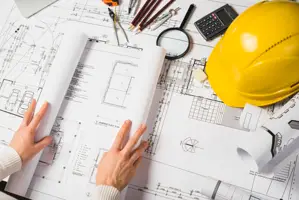Hiring an Engineer for Your Business: A Comprehensive Guide
Like many professions, locating the right engineer for your business can be challenging in today's job market. However, you can enhance your chances of finding the ideal match by taking a few straightforward steps.
Begin by gaining a comprehensive understanding of your requirements, including the type of engineer needed (full-time or freelance), your budget, and your timeline. This article from Aniday will help you to gain an overview on how to hire an engineer with step by step guidance.

The Benefits of Hiring an Engineer
Engineers apply scientific, mathematical, and technological principles to address challenges, bridging discoveries with practical solutions. They play a pivotal role in project management, engineering design, construction, testing, and evaluation, driving innovation and problem-solving.
You might consider hiring an engineer to:
-
Develop and execute engineering solutions.
-
Collaborate on timely and cost-effective completion of engineering projects.
-
Drive continuous improvement and innovation for superior engineering solution
The key steps to follow on hiring an Engineer
In this section, we provide you the essential steps to carry on for yor engineer hiring process as follow
Step 1: Define Your Requirements
The initial step in your engineer search is to clearly outline your specific needs. It's essential to understand the projects, products, or issues that will be the engineer's primary focus.
Determining Employment Type
While determining the engineer's type and level, you should also consider whether you need a full-time, part-time, or contract engineer. This choice depends on factors like project duration, ongoing maintenance needs, and product upgrades. You can explore a more comprehensive guide on employee types to refine your search criteria.
Engineering employees and contract engineers generally have similar salary structures, but hiring full-time employees entails additional costs, including benefits, payroll management, and tax compliance.
If your requirements don't warrant a full-time employee, contractors offer a cost-effective alternative. This approach can also grant access to a more extensive range of skills. However, it is vital to differentiate between employees and contractors to prevent potential legal complications stemming from misclassification.
Listing Engineer Skills & Qualifications
When seeking engineers, certain skills are universally valuable, while qualifications ensure a strong foundation. Consider candidates with proficiency in:
-
Problem-solving
-
Computer science
-
Statistics and analytics
-
Teamwork
-
Effective communication
-
Attention to detail
-
Strategic planning
-
Leadership and project management
-
Organizational skills
-
Scheduling expertise
-
Quality control
In addition to these skills, your ideal engineer should possess the following qualifications:
-
A minimum bachelor's degree in Engineering
-
Relevant experience in their specialty or field
-
Strong technical knowledge
-
A solid background in engineering fundamentals

Establishing a Project Timeline
As you define your needs, particularly when hiring a contract engineer for a specific project or product launch, it's crucial to establish a project timeline. This timeline should align with your hiring schedule, as both will mutually impact one another.
The timeline should account for the following key stages:
-
Initial discussions with the engineer to familiarize them with your company, project objectives, regulatory requirements (if applicable), specific project requirements, and your vision.
-
Post-hiring research period for the engineer to identify any previously unnoticed issues related to your project or idea.
-
Regular check-in meetings to ensure alignment and discuss project updates.
-
The actual work on the project.
-
Time for last-minute revisions, reviews, and adjustments before the final project is concluded.
Maintaining this timeline throughout the hiring process is crucial to avoiding unexpected challenges or disruptions that could impede the project's success.
Step 2: Define Your Budget
When planning your budget, research engineering salaries. On average, engineers make about $99,000 per year or $48 per hour, according to ZipRecruiter. Full-time engineer salaries differ based on their specialization and where they work. For example, chemical engineers in New York might earn approximately $160,000, while environmental engineers in Tennessee could make around $86,000.
Contract engineers typically earn an estimated average hourly wage of $43, as per Glassdoor. Experienced engineers, whether on contract or as full-time employees, might command higher fees due to their expertise but often complete projects more efficiently with added skills.
Step 3: Create an Engineer-specific Job Description for posting
Now that you've considered your staffing requirements and budget, it's time to craft a tailored job description for your engineering role. A well-crafted job description is crucial for attracting the right candidates. It should be concise and detail the essential skills and qualifications required for the position, along with highlighting the advantages of being part of your company.

Sample Engineer Job Description
At [Company X], we are committed to consumer-centric innovation, a principle that has been instrumental in our success in delivering real-world solutions that enhance people's daily lives. We are in search of an experienced engineer to join our team and drive our solutions-focused business model to new heights. This engineer will play a key role within our development team, overseeing projects from inception to fruition. From day one, our engineers engage in hands-on collaboration across various business divisions to design, develop, and test cutting-edge solutions for both national and international clients. The ideal candidate is a creative thinker who shares our dedication to simplifying people's lives.
Role Objectives
-
Gain a comprehensive understanding of the company, products, customers, objectives, and business strategy. Evaluate systems and processes to identify areas for enhancement.
-
Conceptualize and develop solutions based on project requirements and company standards, utilizing simulations and modeling for expansion and improvement.
-
Implement processes to enhance production, ensure quality outcomes, and manage service providers, inspectors, and technical resources.
-
Adhere to national and local regulations, uphold [Company X]'s quality standards, and stay updated on relevant technologies and best practices.
-
Mentor, train, and educate junior engineers, provide technical guidance, and serve as a liaison with customers.
Key Responsibilities
-
Oversee project execution, ensuring timely completion. This involves scope analysis, specification determination, test method establishment, compliance checks, and report preparation.
-
Create comprehensive plans, including calculations, drawings, diagrams, project specs, and budget estimates. Interpret precast reinforcement shop drawings, civil grading plans, and structural drawings.
-
Maintain system functionality through rigorous testing, identify efficiency and productivity improvements, and generate maintenance and support activities for existing solutions.
-
Stay updated on industry trends and implement methods to keep production at the forefront while meeting financial goals and cost-saving targets.
-
Utilize software tools for preparing technical specs, user documentation, presentations, and results tracking.
-
Continuously enhance professional skills through training, education, and networking events.
Required Skills and Qualifications
-
Seven or more years of engineering experience.
-
Proficiency in electronic testing and database design.
-
Strong understanding of electronic manufacturing processes.
-
Strong emphasis on quality control.
-
Proven innovative approach to electronic systems development.
Preferred Skills and Qualifications
-
Bachelor's degree (or equivalent) in engineering from an ABET-accredited program.
-
Professional Engineer (PE) certification.
-
Experience in software development and platform implementation.
-
Demonstrated ability to analyze and troubleshoot production processes.
-
Strong project and team management skills.
Step 4: Interviewing Candidates
With a pool of applicants at your disposal, it's time to assess their resumes and select the candidates for the next phase: interviews. When reviewing their qualifications, consider:
-
Experience in a similar professional environment.
-
Demonstrated skills essential for project completion.
-
A commitment to project fulfillment.
After assembling your final candidate list, initiate the interview scheduling process. During interviews with engineering candidates, focus on questions that reveal insights into their work approach, communication abilities, technical proficiency, and personality.
Step 5: Select a Candidate & Extend an Offer
After conducting interviews, consider the following:
-
Uniform Evaluation Criteria: Establish consistent criteria for assessing all applicants, using scales or numerical ranges. Give greater weight to key job aspects, especially for engineering roles.
-
Final Decision Maker: Appoint one person, often a founder, executive, HR leader, or a technically knowledgeable team member, as the ultimate decision-maker.
Once you've chosen a candidate, present an offer letter outlining the job details, including job title, start date, salary, and relevant bonuses or commissions. Include the full job description in the offer letter for reference and accountability.
Upon completing the offer letter, share it with the candidate, allowing time for review. Use an electronic signature platform for efficiency. Inform other candidates of your selection once the chosen candidate accepts the offer.

What are the challenges of recruiting engineers?
-
Matching Engineers to Job Roles: Hiring engineers involves aligning job descriptions with qualifications and competitive salaries to find the right fit for each role.
-
Competing in a Crowded Market: Recruiting engineers in today's competitive landscape requires building relationships with candidates and offering standout value.
-
Investment in Technical Interviews: Conducting thorough technical interviews is resource-intensive; however, it must be balanced to prevent losing candidates to lengthy processes.
-
Balancing Salaries: Achieving a balance between competitive salaries and budget constraints is vital in retaining top talent.
-
Candidate Profile Information: Automated tools can streamline the collection of comprehensive candidate information.
-
Nurturing Candidate Relationships: Recruiters should maintain connections with potential hires through platforms like LinkedIn and engage passive candidates.
-
Non-uniform Certification: Standardized technical tests ensure fair evaluation, regardless of candidates' certifications.
-
Diversity in the Workforce: Promoting diversity in engineering by hiring from various backgrounds enhances innovation.
-
Challenges in Online Assessments: Implementing non-googleable questions and anti-cheating measures helps assess skills accurately in online assessments.
-
Cultural Fit Assessment: Ensuring cultural alignment between candidates and the organization is essential for fostering a harmonious and effective workforce.
Conclusion
When hiring engineers, specific skills are often a necessity. Yet, by adhering to the steps Aniday has detailed in this article, particularly understanding your requirements, you know how to hire an engineer and hopefully can locate the ideal candidate to position your business for both present and future success.
Aniday's HR Services
Headhunting Service
Find and recruit quality candidates in just 1 week! Supported by 40,000 experienced headhunters in IT, Finance, Marketing… capable of recruiting in any region.
Headhunting Service ➔Employer of Record (EOR) Service
On behalf of your business, we recruit employees and handle payroll without the need to establish a company in markets such as Vietnam, Singapore, Malaysia, India, Indonesia…
Employer of Record (EOR) Service ➔